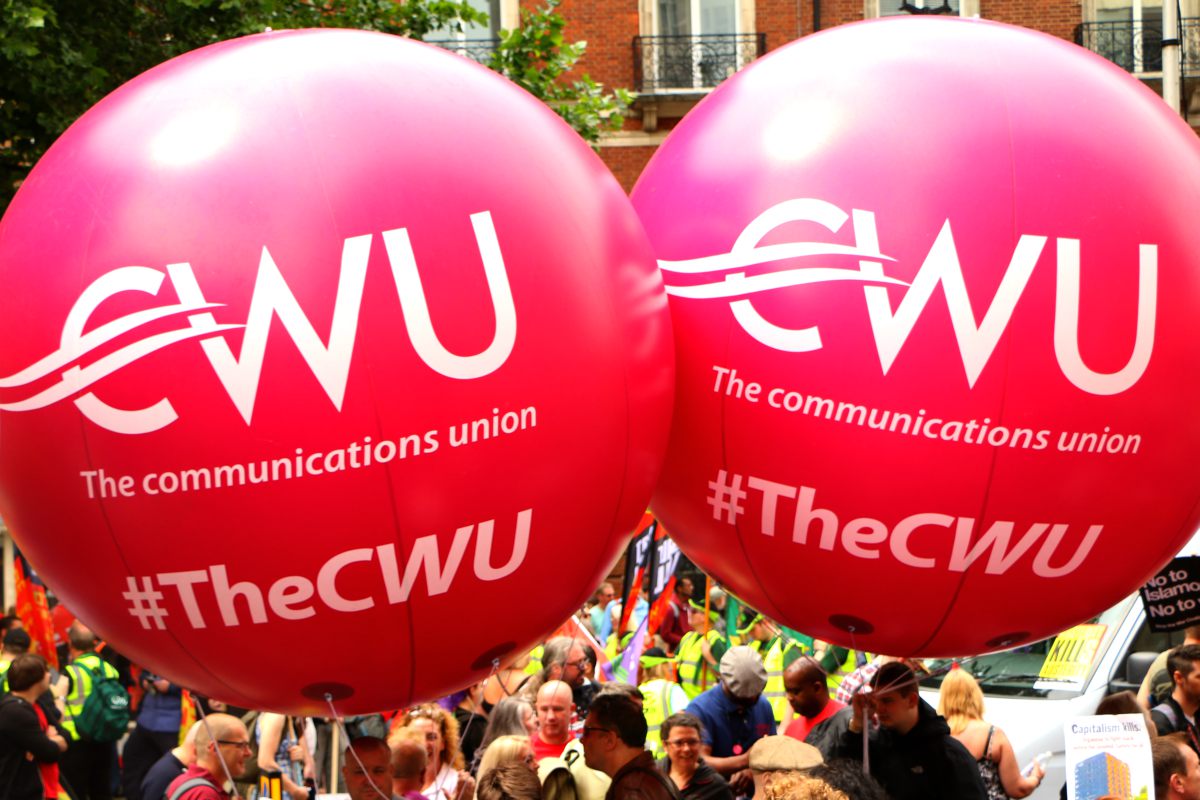Delegates to the CWU policy conference this Sunday will be discussing an important motion calling for Labour to restore Clause 4 – the party’s commitment to public ownership. We urge all delegates to support this resolution.
This year’s policy conference of the Communication Workers Union (CWU) takes place this weekend in Bournemouth, on Sunday 28 April. After this there will be several days of sector conferences and a rules revision conference.
Amongst the motions to be debated at the policy conference is a composite resolution (composite 54) moved by several union branches in favour of nationalisation and the principles laid out in Labour’s original Clause 4. In particular, the motion calls for the CWU “to seek to restore the principles of Clause Four as part of the aims of the Labour Party”.
The CWU organises workers in the postal service and telecommunications. CWU members, therefore, have seen first hand the disastrous impact of privatisation.
We understand that this motion to restore Clause 4 is endorsed by the CWU national executive committee (NEC). We call on all CWU conference delegates and branches to offer their support to this motion also. And we ask that the union’s delegation to the Labour Party conference in September support the motion to restore the original Clause 4 that is set to be on the agenda.
The motion to CWU conference reads:
The Labour Party was created to put an end to this dog-eat-dog society. Its aim was “common ownership”, and for a society based on need not profit.
This was written into Labour’s Constitution as Clause Four, guaranteeing “to secure for the workers, by hand or by brain, the full fruits of their industry.”
This was abolished by Tony Blair in 1995, instead committing the Party to “enterprise of the market” and the “rigour of competition”, which justified previous Tory privatisation and set future Labour government policy.
Conference recognises the massive increased public support for nationalisation. The Legatum Institute, a think-tank, and Populus recently showed support for the re-nationalisation of water at 83%, followed by both electricity and gas at 77%, and the railways at 76%. Even without a campaign, there was 50% support for the nationalisation of the banks.
Conference notes at the last Labour Conference, John McDonnell, the shadow chancellor, stated that the “common ownership” principles of the original Clause Four “are as relevant today as they were back then”.
Conference therefore instructs the NEC to support campaigns and initiatives by like–minded organisations that promote the renationalisation of our previous public companies and seek to restore the principles of Clause Four as part of the aims of the Labour Party.
The NEC should also consider submitting a proposition to Labour Party and TUC conference to support these aims and objectives. The execution of the policy contained within this motion should not in any way undermined or diminish the role of trade unions.
Moved by:
South East Wales Amalgamated
London Postal Engineering
Essex Amalgamated Branch
Plymouth and East Cornwall
Greater London Combined
Preparing for battle
 Other than the motion to bring back Clause 4, a number of other motions also raise important issues in relation to the Labour Party.
Other than the motion to bring back Clause 4, a number of other motions also raise important issues in relation to the Labour Party.
Motion 50 calls for the voting records of sponsored MPs to be made available so that members can see how they voted. This should be linked to the demand for mandatory reselection. Knowing MPs’ voting records is only useful if action is then taken to deselect those MPs who have not defended union policies.
Motion 52 calls for more effort to be taken to get CWU members involved in the political process, including standing as Labour candidates. We need working class representation, with elected representatives who will fight for our interests.
Motion 53 calls for more work to be done by the unions to organise those in the ‘gig economy’.
Most of these motions are likely to enjoy wide support. There will likely be some argument, however, over the ongoing issue of the possible sale of union assets.
We also urge delegates to also support Motion 58, calling for the removal of the anti-trade laws. The entire trade union movement should push for a Labour government that will act on this without delay once in power.
Elsewhere, the motions to oppose attacks on the NHS (9) and for the reversal of local authority cuts (10) should both be carried. Motion 10 calls for Labour councils to “refuse to make cuts”. But we should highlight that there is a limit to just feeding off reserves to fund this. At some point a so-called ‘illegal’ no-cuts budget must be passed and a campaign launched to fight the austerity and attacks from central government.
The call must be for Labour to reverse all cuts and provide proper funding by offering a bold socialist alternative. Within this context, the call in motion 75 for a nationwide Labour movement campaign against cuts is correct – but this must be backed up with mass action from Labour councils.
By pledging to bring back Clause 4, this year’s CWU conference can set the tone for the battles ahead. It will show that the CWU is ready to link up with other trade unions to defend members against cuts and privatisation, and to fight to bring in a socialist Labour government.






